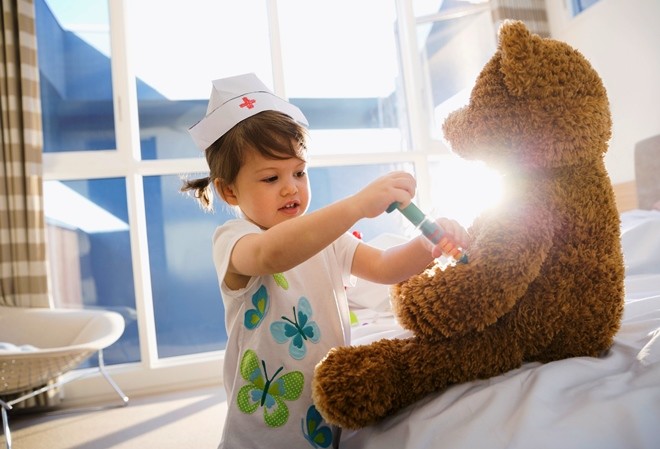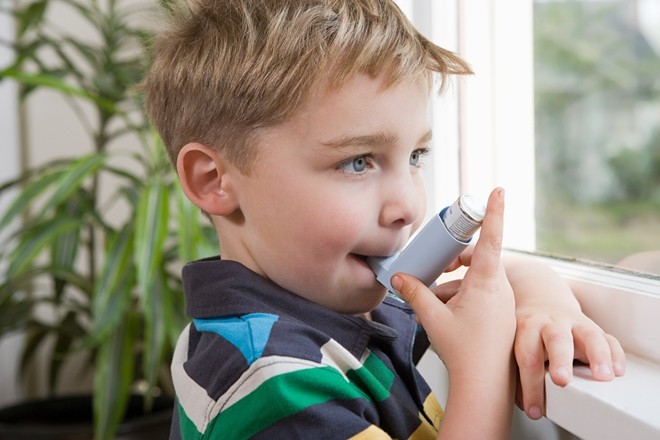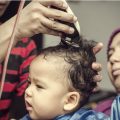When my child was four months old,polyclinic made a complex inoculation from DTP (whooping cough, diphtheria, tetanus) and polio. An hour later, diarrhea began, and two days later the baby was covered with a rash. The doctor diagnosed "allergic dermatitis". Six months they treated the disease. Zhanna, 32, Rostov-on-Don- Stool disorder and rash may be a reaction to vaccination. DTP is not the best Russian vaccine in terms of quality. If children have any health problems, I would recommend import analogs for them - infrarix or pentaxim, they have less undesirable consequences. But I do not advise you to neglect this vaccination. Pertussis, diphtheria, tetanus and poliomyelitis are dangerous infections from which it is necessary to protect the child. In this case, it was necessary not to fight with dermatitis (this is only a consequence), and eliminate the cause - the hyperreaction of the body, allergy. And only then restore the flora of the intestine and treat the skin. A photo: Getty ImagesIn a month my son started diathesis. Later, they revealed an allergy to cow's milk, a squirrel of chicken eggs, a blossoming of trees and much more. However, pediatricians insisted that vaccination is necessary. She did inoculations with delay, and for the time being without consequences. In a year eight months were vaccinated against measles, paratitis and rubella. A few days later, the child had an attack of suffocation. In the hospital, an attack was taken, he was discharged, and soon the son became ill with pneumonia. Two months later they wandered to the doctors, after which the child was diagnosed with bronchial asthma of high severity, atopic dermatitis and pollinosis. Since then, I am very afraid of vaccinations and writing refusals. Natalia, 27, Moscow. The child was originally allergic, which means that he is at risk for developing such diseases as bronchitis, asthma, hay fever, croup. So he did not buy asthma because of the vaccination. Attack of suffocation - here, most likely, is meant croup. Vaccination could strike at the immunity of the child and, possibly, provoked swelling of the mucous throat. In every family where an allergic baby is growing, there must be a nebulizer with pulmicort for such force majeure situations, which quickly helps to remove swelling. And the fact that the child's allergic edema resulted in pneumonia, indicates that he did not receive the correct anti-inflammatory treatment in time. And yet I am convinced that allergies need to be vaccinated. They are stronger than ordinary children, are prone to infections, they are more difficult to bear, and it is much more difficult to treat them. But you can not vaccinate allergic people during the period of exacerbation of the disease. It is important to find a period of stable remission. For example, those who have pollinosis - a negative reaction to flowering - can be vaccinated only in winter. And it is desirable to do it in a hospital, under the supervision of a trusted doctor, whom you trust. In a year and a half the child was vaccinated against DTP. On the third day the son began to wheeze and gasp. Temperatures are not present, the rhinitis is not present, the throat in norm or rate. Called to the house the doctor delivered. Now every time from the slightest cold there is a strongest laryngotracheitis. Svetlana, 35, Ivanovo. Most likely, the child had a genetic predisposition to bronchial and respiratory tract diseases. Could the vaccine provoke obstructive bronchitis? Hardly. Perhaps it has become a kind of catalyst. Chryps on the third day - too slow reaction. Typically, the body reacts to the vaccination for several hours. I made a child of eight years in a polyclinic inoculated against the flu. A week later he became ill with the most real flu - a temperature of 40 with all the ensuing consequences. She was called by a pediatrician not from a polyclinic, she told me that the flu strain is so often mutated that, perhaps, because of this, the vaccination could not protect it. Elena, 29 years old, Moscow - Flu should be vaccinated two to three weeks before the beginning of the epidemic. If you are late and already many are ill, there is a big chance of catching the virus. Influenza strains do mutate, and there is a risk of getting sick even if vaccinated. But if the vaccination is done in a timely and correct way, you and your child will carry it easier and without complications. It happens that the parents of children from flu are vaccinated, and they themselves think that they do not need it. So, you can become a carrier of the virus, transfer it easily and transfer it to your vaccinated child. Therefore, it is advisable to vaccinate against all members of the family from the flu.
A photo: Getty ImagesIn a month my son started diathesis. Later, they revealed an allergy to cow's milk, a squirrel of chicken eggs, a blossoming of trees and much more. However, pediatricians insisted that vaccination is necessary. She did inoculations with delay, and for the time being without consequences. In a year eight months were vaccinated against measles, paratitis and rubella. A few days later, the child had an attack of suffocation. In the hospital, an attack was taken, he was discharged, and soon the son became ill with pneumonia. Two months later they wandered to the doctors, after which the child was diagnosed with bronchial asthma of high severity, atopic dermatitis and pollinosis. Since then, I am very afraid of vaccinations and writing refusals. Natalia, 27, Moscow. The child was originally allergic, which means that he is at risk for developing such diseases as bronchitis, asthma, hay fever, croup. So he did not buy asthma because of the vaccination. Attack of suffocation - here, most likely, is meant croup. Vaccination could strike at the immunity of the child and, possibly, provoked swelling of the mucous throat. In every family where an allergic baby is growing, there must be a nebulizer with pulmicort for such force majeure situations, which quickly helps to remove swelling. And the fact that the child's allergic edema resulted in pneumonia, indicates that he did not receive the correct anti-inflammatory treatment in time. And yet I am convinced that allergies need to be vaccinated. They are stronger than ordinary children, are prone to infections, they are more difficult to bear, and it is much more difficult to treat them. But you can not vaccinate allergic people during the period of exacerbation of the disease. It is important to find a period of stable remission. For example, those who have pollinosis - a negative reaction to flowering - can be vaccinated only in winter. And it is desirable to do it in a hospital, under the supervision of a trusted doctor, whom you trust. In a year and a half the child was vaccinated against DTP. On the third day the son began to wheeze and gasp. Temperatures are not present, the rhinitis is not present, the throat in norm or rate. Called to the house the doctor delivered. Now every time from the slightest cold there is a strongest laryngotracheitis. Svetlana, 35, Ivanovo. Most likely, the child had a genetic predisposition to bronchial and respiratory tract diseases. Could the vaccine provoke obstructive bronchitis? Hardly. Perhaps it has become a kind of catalyst. Chryps on the third day - too slow reaction. Typically, the body reacts to the vaccination for several hours. I made a child of eight years in a polyclinic inoculated against the flu. A week later he became ill with the most real flu - a temperature of 40 with all the ensuing consequences. She was called by a pediatrician not from a polyclinic, she told me that the flu strain is so often mutated that, perhaps, because of this, the vaccination could not protect it. Elena, 29 years old, Moscow - Flu should be vaccinated two to three weeks before the beginning of the epidemic. If you are late and already many are ill, there is a big chance of catching the virus. Influenza strains do mutate, and there is a risk of getting sick even if vaccinated. But if the vaccination is done in a timely and correct way, you and your child will carry it easier and without complications. It happens that the parents of children from flu are vaccinated, and they themselves think that they do not need it. So, you can become a carrier of the virus, transfer it easily and transfer it to your vaccinated child. Therefore, it is advisable to vaccinate against all members of the family from the flu. A photo: GettyImagesAfter the vaccination from hepatitis B in the hospital, the child had seizures, a hemorrhage in the brain, a diagnosis - hydrocephalus. While he was observed in utero, everything was fine, without pathologies. As a result, the child is growing morbid, now he is 2 years 7 months old, he lags behind in development, really does not speak. There were neurological problems. I do not vaccinate my son anymore. Tatiana, 31, Ekaterinburg- Neurological disorders and hydrocephalus, most likely, were in the baby's womb in the womb. They might not have been noticed during pregnancy. Or they arose as a result of birth trauma. The vaccination alone would not lead to this diagnosis, but convulsions could provoke. Since hepatitis B is vaccinated in the first 24 hours of life, it is likely that doctors did not have time to assess the health of this child. If you have neurological problems, you can not vaccinate a baby. And vaccinations are contraindicated for children who have immunodeficiency since birth (weak immunity). At five years old my daughter fell ill with whooping cough, got infected from her aunt. When I asked the pediatrician: "We are vaccinated, why do we have whooping cough?", They answered me: "It could be worse." How much worse? My daughter and I were in the hospital for 4 months. Then almost half a year the child could not run - cough began. After that, I did not do any vaccinations. When the school doctor begins to insist on vaccination, I write a refusal. Nelli, 38, St. Petersburg. If a child was vaccinated against whooping cough, he could catch them only if he had a serious impairment of immunity or a substandard drug was caught. This should not be! If a child falls ill with a disease from which he was vaccinated, he should be examined urgently from a clinical immunologist. And more: the pediatrician should honestly tell his parents about the risks with consent to vaccination and refusal from it. And parents should assess these risks and make a responsible decision. And it is better to get vaccinated from a doctor who knows your child's particularities. At seven months, my daughter was vaccinated against poliomyelitis. After her about three weeks later, she had a row three times: twice in a hospital with obstructive bronchitis, then with laryngitis. And so three months could not get out of illness. I do not know if this is related to vaccination. Is it from her immunity fell? Inga, 23, Irkutsk-The polio vaccine could not give such a complication - obstruction of the bronchi. And the fact that the child is prone to bronchitis and laryngitis, says that he has a reactive reaction to viruses - he is allergic. I had been ill three times, probably because from the first time the disease was not cured. They removed the symptoms, and the obstruction in the bronchi remained and when encountering any infection manifested itself with a new force. She made a measles vaccination for her two-year-old son. Two weeks later, the whole was covered with a rash, then with large spots that came down from my head into my arms, trunk and legs. It is very unpleasant to see how a child who did not previously have allergic reactions turns into one red spot due to a completely "safe" vaccine ... Eugene, 33, Lipetsk. Judging by the description, this is still an allergic reaction to the inoculation - hives. Perhaps the body responded in this way to a live measles vaccine. It is stronger and more effective than inanimate, which, naturally, also protects from infection, but is weaker. However, a live vaccine is more powerful than immunity, has more unpleasant consequences. Therefore, children at risk who have certain health problems, I still recommend sparing non-living vaccines.
A photo: GettyImagesAfter the vaccination from hepatitis B in the hospital, the child had seizures, a hemorrhage in the brain, a diagnosis - hydrocephalus. While he was observed in utero, everything was fine, without pathologies. As a result, the child is growing morbid, now he is 2 years 7 months old, he lags behind in development, really does not speak. There were neurological problems. I do not vaccinate my son anymore. Tatiana, 31, Ekaterinburg- Neurological disorders and hydrocephalus, most likely, were in the baby's womb in the womb. They might not have been noticed during pregnancy. Or they arose as a result of birth trauma. The vaccination alone would not lead to this diagnosis, but convulsions could provoke. Since hepatitis B is vaccinated in the first 24 hours of life, it is likely that doctors did not have time to assess the health of this child. If you have neurological problems, you can not vaccinate a baby. And vaccinations are contraindicated for children who have immunodeficiency since birth (weak immunity). At five years old my daughter fell ill with whooping cough, got infected from her aunt. When I asked the pediatrician: "We are vaccinated, why do we have whooping cough?", They answered me: "It could be worse." How much worse? My daughter and I were in the hospital for 4 months. Then almost half a year the child could not run - cough began. After that, I did not do any vaccinations. When the school doctor begins to insist on vaccination, I write a refusal. Nelli, 38, St. Petersburg. If a child was vaccinated against whooping cough, he could catch them only if he had a serious impairment of immunity or a substandard drug was caught. This should not be! If a child falls ill with a disease from which he was vaccinated, he should be examined urgently from a clinical immunologist. And more: the pediatrician should honestly tell his parents about the risks with consent to vaccination and refusal from it. And parents should assess these risks and make a responsible decision. And it is better to get vaccinated from a doctor who knows your child's particularities. At seven months, my daughter was vaccinated against poliomyelitis. After her about three weeks later, she had a row three times: twice in a hospital with obstructive bronchitis, then with laryngitis. And so three months could not get out of illness. I do not know if this is related to vaccination. Is it from her immunity fell? Inga, 23, Irkutsk-The polio vaccine could not give such a complication - obstruction of the bronchi. And the fact that the child is prone to bronchitis and laryngitis, says that he has a reactive reaction to viruses - he is allergic. I had been ill three times, probably because from the first time the disease was not cured. They removed the symptoms, and the obstruction in the bronchi remained and when encountering any infection manifested itself with a new force. She made a measles vaccination for her two-year-old son. Two weeks later, the whole was covered with a rash, then with large spots that came down from my head into my arms, trunk and legs. It is very unpleasant to see how a child who did not previously have allergic reactions turns into one red spot due to a completely "safe" vaccine ... Eugene, 33, Lipetsk. Judging by the description, this is still an allergic reaction to the inoculation - hives. Perhaps the body responded in this way to a live measles vaccine. It is stronger and more effective than inanimate, which, naturally, also protects from infection, but is weaker. However, a live vaccine is more powerful than immunity, has more unpleasant consequences. Therefore, children at risk who have certain health problems, I still recommend sparing non-living vaccines. Photo:Getty ImagesAndrey Prodeus on what everyone needs to know about vaccinations: – Vaccinations were invented to protect people from life-threatening infections. Doctors suggest vaccinating children against diseases that are severe or cannot be cured at all. Vaccinations reduce risks. Yes, there are negative reactions. But if you analyze statistics, out of a hundred vaccinations, only one or two have any bad consequences.• Any child who is not vaccinated is a reservoir for viruses and poses a danger to other children.• Everyone should be vaccinated, but the doctor’s approach to each patient should be individual.• Vaccinations should only be carried out if the child is absolutely healthy and has not been in contact with sick household members the day before. To be on the safe side, you can do a general blood and urine test in advance.• The quality of vaccines, of course, varies and sometimes leaves much to be desired. Here again, you should contact a trusted doctor so that he can select the safest drug specifically for your child. But it is worth remembering that there are no vaccines in the world that have no side effects at all. It is also useful to know:
Photo:Getty ImagesAndrey Prodeus on what everyone needs to know about vaccinations: – Vaccinations were invented to protect people from life-threatening infections. Doctors suggest vaccinating children against diseases that are severe or cannot be cured at all. Vaccinations reduce risks. Yes, there are negative reactions. But if you analyze statistics, out of a hundred vaccinations, only one or two have any bad consequences.• Any child who is not vaccinated is a reservoir for viruses and poses a danger to other children.• Everyone should be vaccinated, but the doctor’s approach to each patient should be individual.• Vaccinations should only be carried out if the child is absolutely healthy and has not been in contact with sick household members the day before. To be on the safe side, you can do a general blood and urine test in advance.• The quality of vaccines, of course, varies and sometimes leaves much to be desired. Here again, you should contact a trusted doctor so that he can select the safest drug specifically for your child. But it is worth remembering that there are no vaccines in the world that have no side effects at all. It is also useful to know:

Making Money with Desserts: Success Stories
Evgeniya Polischuk (Fedutinova) instagram:@evgeniyafedutinovavk.com/janeshomebaking– It all started with baking for family and friends. Gradually, I started posting photos of my baked goods on Instagram – and orders started coming in. I made my first custom-made cake on October 13, 2014, and a little earlier I started making macaroons and cupcakes. You could say that the business “found me”, I am very […]

Soups are cold recipes with photos
Cold cucumber soup with yogurt and lemonsorbet from the chef of the restaurant La Taverna Alexander Zhurkin Photo: Getty Images Ingredients: Plain yoghurt – 125 g Cucumber – 150 g Lemon/lime sorbet – 50 g Cocktail shrimp – 24 g Fresh ginger juice – 1 g Lime juice – 5 g Fresh orange juice – 5 g Parsley – 1 g Pink pepper – 1 g Watercress – […]

barbeque kebab
Pork tenderloin in glaze Photo:Dmitry Bayrak/dbstudioPreparation time: 20 minutes + marinating time.Calories: 454 kcal per serving.For 4 servings: 4 pork tenderloins (approximately 300 g each), 1 onion, 2 cloves of garlic, 1 tsp. lemon zest, 1 tsp. lemon juice, a pinch of ground cumin, coriander and turmeric, 1 tbsp. vegetable […]

Pierre Duacan: dietary recipes: Ducane diet
Beetroot soup Photo:Season’S, Luxury Hotels RepresentationYou will need:· Boiled beetroot – 60 g· Fresh cucumbers – 20 g· Red radish – 20 g· Green onions – 10 g· Egg – 1 pc.· Drinking mineral water – 200 g· Salt – 1 gPreparation:· Boil the egg and beetroot.· Grate the cucumbers, radish and part of the beetroot. Put everything […]





